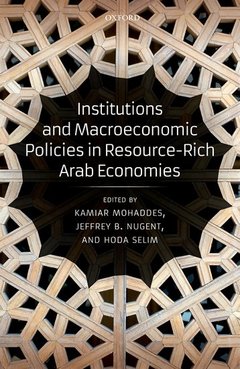Description
Institutions and Macroeconomic Policies in Resource-Rich Arab Economies
Coordinators: Mohaddes Kamiar, Nugent Jeffrey B., Selim Hoda
Language: English
Subjects for Institutions and Macroeconomic Policies in Resource-Rich...:
Publication date: 05-2019
466 p. · 15.8x24 cm · Hardback
466 p. · 15.8x24 cm · Hardback
Description
/li>Biography
/li>
For over eighty years the Arab region has been deriving massive wealth from its natural resources. Nevertheless, its economic performance has been at the mercy of ebbs and flows of oil prices and its resources have been slowly depleting. The two critical questions are why and how Arab countries might escape the oil curse. Institutions and Macroeconomic Policies in Resource-Rich Arab Economies focuses on the unique features of the Arab world to explain the disappointing outcomes of macroeconomic policy. It explores the interaction between oil and institutions to draw policy recommendations on how Arab countries can best exploit their oil revenues to avoid the resource curse. Case studies and contributions from experts provide an understanding of macroeconomic institutions (including their underlying rules, procedures and institutional arrangements) in oil-rich Arab economies and of their political economy environment, which has largely been overlooked in previous research. Institutions and Macroeconomic Policies in Resource-Rich Arab Economies offers novel macroeconomic policy propositions for exchange rate regimes, fiscal policy and oil wealth distribution that is more consistent with macroeconomic stability and fiscal sustainability. These policy reforms, if implemented successfully, could go a long way in helping the resource-rich countries of the Arab region and elsewhere to avoid the oil curse.
Kamiar Mohaddes is a Janeway Fellow in Economics at the University of Cambridge and a Senior Lecturer and Fellow in Economics at Girton College, University of Cambridge. He is a Research Fellow of the Economic Research Forum, and serves as its Thematic Co-Leader for the macroeconomics theme. His main areas of research are macroeconomics, global and national macroeconometric modelling, and energy economics. His research has been published in edited volumes and leading journals, and has been covered in major international news outlets. He holds a PhD in Economics from the University of Cambridge. Jeffrey Nugent is a Development Economist who has worked on a wide variety of issues, problems and analytical techniques and in and on a variety of countries from Latin America, Africa, South and East Asia and especially the Middle East and North Africa. In recent years, much of it has made use of new institutional economics and political economy perspectives. Among his most recent research interests in the Middle East region have been the measurement, determinants and effects of rigidity in labor regulations, trade and economic integration, the effects of natural resources on institutions and growth, conflict, refugees and approaches to conflict resolution. Hoda Selim is an Economist at International Monetary Fund. Previously, she worked the Economic Research Forum (ERF) in Cairo and the World Bank's Cairo Office. She is a research fellow at ERF. Her research focuses on the macroeconomics of oil management, the political economy of development as well as macroeconomic policy issues in the Arab region. She is a contributor to International Development Ideas, Experience, and Prospects (Oxford University Press, 2014). Her co-edited volume, Understanding and Avoiding the Oil Curse in the Arab World, was published in 2016 (Cambridge University Press).
© 2024 LAVOISIER S.A.S.




